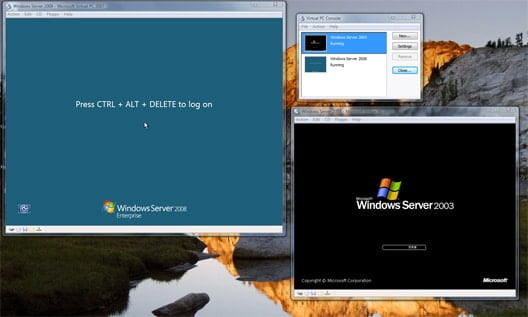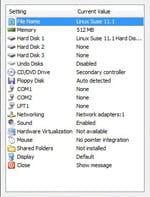My review of Microsoft Virtual PC 2007. Virtualization software allows you to run multiple PC-based operating systems simultaneously on one workstation, providing a safety net to maintain compatibility with legacy applications while you migrate to a new operating system. It also saves reconfiguration time, so your support, development, and training staff can work more efficiently.

Microsoft has released several versions of their virtualization software, catered for both home users (Virtual PC 2004, 2007, 2011) and corporate IT departments (Virtual Server 2005, Hyper-V, and has been incorporated into Windows Server 2008), which allows you create separate virtual machines (installations of operating systems) on your Windows desktop. In simplest terms, virtualization allows you to run two or more operating systems on the same computer, at the same time; talk about an improvement over duel-booting.
A virtual machine mimics (virtualizes) the hardware of a complete physical computer. It is common for virtual machines to run operating systems such as MS-DOS, Windows, and OS/2, allowing you to run legacy applications with ease, or simply try out a new operating system without sacrificing your existing Windows configuration.
Virtualization allows for:
- Ease Migration: Run legacy applications in a virtual machine instead of delaying the deployment of a new operating system just because of application incompatibility. Test your migration plans using virtual machines instead of actual physical computers.
- Do More in Less Time: Support staff can run multiple operating systems on a single physical computer and switch between them easily. They can also restore virtual machines to their previous state almost instantly. Train students on multiple operating systems and virtual networks instead of purchasing and supporting additional computers.
- Streamline Deployment: Test software on different operating systems more easily. One crashing application or operating system doesn’t affect others.
- Accelerate Development: Increase quality assurance by testing and documenting your software on multiple operating systems using virtual machines. Decrease time-to-market by reducing reconfiguration time.
Virtual PC 2007
While Virtual Server 2005 requires an advanced desktop or Windows Server configuration, which includes an installation of Windows Internet Information Services (IIS), Microsoft’s Virtual PC 2007 is family-friendly version of Microsoft’s powerful virtualization technology designed with the Home User in mind and is offered as a FREE application download from Microsoft. The software includes an intuitive user interface that allows even the novice “virtualoso” to get moving on their first install.
To simplify this task, Microsoft has also released evaluation versions of several operating systems including Windows Server 2008, and Microsoft Vista s that can be downloaded and quickly added to your virtual PC world. In addition, Novel has also released a preinstalled VHD (virtual hard drive) version of SUSE Linux Enterprise Server (SLES). To simplify your own search, simply look for VHD or Virtual Hard Drive in your favourite search engine. Be warned, most of the applications are large and can span several gigabytes (GB) of data.
I am currently running copies of SUSU Linux version 11.1, and evaluation versions of Windows Server 2003 and Windows Server 2008 on Virtual PC 2007 SP1. I would love to be able to test out Microsofts stand-alone server version of their Hyper-V Server, however, the minimum requirements include a 64 bit cpu. If anyone is willing to donate a 64 bit workstation with above-average RAM, I would be more than happy to give it the once over.
How can I get SUSE 11.1 to install on Virtual PC 2007?
Here is a little hint, you need to include the following starup option, otherwise the installation will freeze: noreplace-paravirt i8042.noloop clock=pit
Virtual PC System requirements can be Steep
The Virtual PC application requires a 400 MHz Pentium-compatible processor (1.0 GHz or faster recommended), and requires approximately 35 MB of disk space. It runs on Windows Vista Business, Windows Vista Enterprise, Windows Vista Ultimate, Windows XP Professional, or Windows XP Tablet PC Edition, Windows Vista SP1 (Enterprise, Business, Ultimate), Windows XP SP3.
The real requirements for running Virtual PC are those necessary to support the guest operating systems that you will run. Add the disk requirements for every guest OS you’ll install and add the memory requirements for every guest OS you will run simultaneously, plus memory for the host OS. For example, you will need 1 GB of free memory (RAM) to be able to allocate the same amount to the virtual operating system.
Below are the requirements for some of the operating systems that can be run as a guest operating system. Virtual PC can run most x86 operating systems, not just the operating systems listed below, in a virtual machine environment.
Guest Operating System | Minimum Memory | Minimum Hard-Disk Space |
| Windows 98, Windows 98 Second Edition | 64 MB | 500 MB |
| Windows Millennium Edition (Windows Me) | 96 MB | 2 GB |
| Windows 2000 Professional | 96 MB | 2 GB |
| Windows XP Home Edition | 128 MB | 2 GB |
| Windows XP Professional | 128 MB | 2 GB |
| Windows Vista Enterprise | 512 MB | 15 GB |
| Windows Vista Business | 512 MB | 15 GB |
| Windows Vista Ultimate | 512 MB | 15 GB |
| Windows Vista SP1 (Business, Enterprise, Ultimate) | 512 MB | 15 GB |
| Windows XP SP3 | 256 MB | 3 GB |
| Windows Server 2008 | 512 MB | 20 GB |
| OS/2 | 64 MB | 500 MB |
Keep in mind that these are minimum requirements. Installing applications in a guest OS increase requirements. Increasing memory beyond the minimum can result in significant performance increases.
Other Contenders in the Virtualization World
ere are countless debates over who is the leader of the virtualized world. Here are a few links to some of the competitors, I will let you decide on your favourite: Virtual Box, VMware Player, QEMU, and Bochs.



